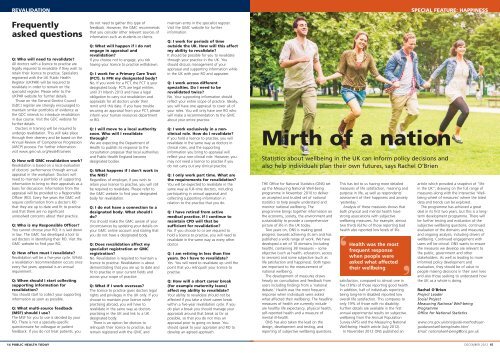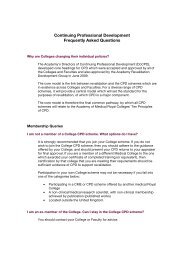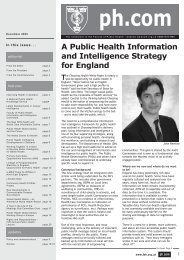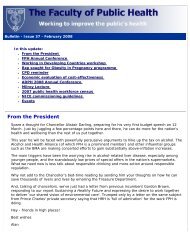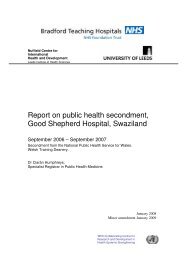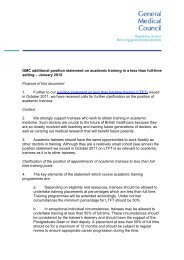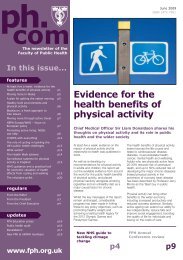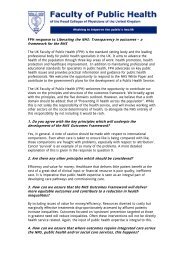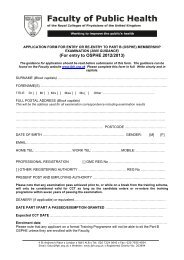December Edition â Happiness - UK Faculty of Public Health
December Edition â Happiness - UK Faculty of Public Health
December Edition â Happiness - UK Faculty of Public Health
- No tags were found...
Create successful ePaper yourself
Turn your PDF publications into a flip-book with our unique Google optimized e-Paper software.
REVALIDATIONSPECIAL FEATURE: HAPPINESSFrequentlyasked questionsQ: Who will need to revalidate?All doctors with a licence to practise arelegally required to revalidate if they wish toretain their licence to practise. Specialistsregistered with the <strong>UK</strong> <strong>Public</strong> <strong>Health</strong>Register (<strong>UK</strong>PHR) will be required torevalidate in order to remain on thespecialist register. Please refer to the<strong>UK</strong>PHR website for further details.Those on the General Dentist Council(GDC) register are strongly encouraged tomaintain similar portfolios <strong>of</strong> evidence asthe GDC intends to introduce revalidationin due course. Visit the GDC website forfurther details.Doctors in training will be required toundergo revalidation. This will take placethrough their deanery and be based on theAnnual Review <strong>of</strong> Competence Progression(ARCP) process. For further informationvisit www.gmc-uk.org/reval4traineesQ: How will GMC revalidation work?Revalidation is based on a local evaluation<strong>of</strong> doctors’ performance through annualappraisal in the workplace. Doctors willneed to maintain a portfolio <strong>of</strong> supportinginformation to bring to their appraisals as abasis for discussion. Information from theappraisal will be provided to a ResponsibleOfficer (RO). Every five years the GMC willrequire confirmation from a doctor’s ROthat they are up to date and fit to practiseand that there are no significantunresolved concerns about their practice.Q: Who is my Responsible Officer?You cannot choose your RO; it is laid downin law. The GMC has developed a tool toaid doctors in identifying their RO. Visit theGMC website to find your RO.Q: How <strong>of</strong>ten must I revalidate?Revalidation will be a five-year cycle. Whilsta revalidation recommendation occurs onceevery five years, appraisal is an annualrequirement.Q: When should I start collectingsupporting information forrevalidation?You should start to collect your supportinginformation as soon as possible.Q: What multi-source feedback(MSF) should I use?The MSF for you to use is decided by yourRO. There is not a specialty-specificquestionnaire for colleague or patientfeedback. If you do not treat patients, youdo not need to gather this type <strong>of</strong>feedback. However, the GMC recommendsthat you consider other relevant sources <strong>of</strong>information such as students or clients.Q: What will happen if I do notengage in appraisal andrevalidation?If you choose not to engage, you riskhaving your licence to practise withdrawn.Q: I work for a Primary Care Trust(PCT). Is FPH my designated body?No. If you work for a PCT, the PCT is yourdesignated body. PCTs are legal entitiesuntil 31 March 2013 and have a legalobligation to carry out revalidation andappraisals for all doctors under theirremit until this date. If you have troublesecuring an appraisal from your PCT, pleaseinform your human resources departmentor RO.Q: I will move to a local authoritysoon. Who will I revalidatethrough?We are expecting the Department <strong>of</strong><strong>Health</strong> to publish its response to theconsultation proposal that local authoritiesand <strong>Public</strong> <strong>Health</strong> England becomedesignated bodies.Q: What happens if I don’t work inthe NHS?Regardless <strong>of</strong> employer, if you wish toretain your licence to practise, you will stillbe required to revalidate. Please refer tothe GMC website to find your designatedbody for revalidation.Q: I do not have a connection to adesignated body. What should Ido?You should make the GMC aware <strong>of</strong> yourcircumstances by updating your details onyour GMC online account and stating thatyou do not have a designated body.Q: Does revalidation affect myspecialist registration or GMCregistration?No. Revalidation is required to maintain alicence to practise. Revalidation is aboutdemonstrating that you are up to date andfit to practise in your current fields andacross your scope <strong>of</strong> practice.Q: What if I work overseas?The licence to practise gives doctors legalrights and privileges in the <strong>UK</strong> only. If youchoose to maintain your licence whilepractising abroad, you will have torevalidate in the same way as doctorspractising in the <strong>UK</strong> and link to a <strong>UK</strong>designated body.There is an option for doctors torelinquish their licence to practise, butremain registered with the GMC andmaintain entry in the specialist register.Visit the GMC website for furtherinformation.Q: I work for periods <strong>of</strong> timeoutside the <strong>UK</strong>. How will this affectmy ability to revalidate?It should be possible for you to revalidatethrough your practice in the <strong>UK</strong>. Youshould discuss management <strong>of</strong> yourappraisal and supporting information whilein the <strong>UK</strong> with your RO and appraiser.Q: I work across differentspecialties. Do I need to berevalidated twice?No. Your supporting information shouldreflect your entire scope <strong>of</strong> practice. Ideally,you will have one appraisal to cover all <strong>of</strong>your roles. You will only have one RO whowill make a recommendation to the GMCabout your entire practice.Q: I work exclusively in a nonclinicalrole. How do I revalidate?If you hold a licence to practise, you willrevalidate in the same way as doctors inclinical roles, and the supportinginformation you bring to appraisal willreflect your non-clinical role. However, youmay not need a licence to practise if youdo not carry out any clinical practice.Q: I only work part time. What arethe requirements for revalidation?You will be expected to revalidate in thesame way as full-time doctors, includingparticipating in annual appraisal andcollecting supporting information inrelation to the practice that you do.Q: I have retired from activemedical practice. If I continue tomaintain CPD will that besufficient for revalidation?No. If you choose to or are required tohold a licence to practise, you will need torevalidate in the same way as every otherdoctor.Q: I am retiring in less than fiveyears. Do I have to revalidate?Yes. You will need to revalidate up until thepoint that you relinquish your licence topractise.Q: How will a short career break(for example maternity leave)affect my ability to revalidate?Your ability to revalidate should not beaffected if you take a short career breakwithin a five-year revalidation cycle. If youdo plan a break you should manage yourappraisals around that break as far aspossible, so that you do not miss anappraisal prior to going on leave. Youshould speak to your appraiser and RO todevelop an agreed approach.Mirth <strong>of</strong> a nationStatistics about wellbeing in the <strong>UK</strong> can inform policy decisions andalso help individuals plan their own futures, says Rachel O’BrienTHE Office for National Statistics (ONS) setup the Measuring National Well-beingprogramme in November 2010 to deliveran accepted and trusted set <strong>of</strong> nationalstatistics to help people understand andmonitor national wellbeing. Theprogramme brings together information onthe economy, society, the environment andsustainability to provide a comprehensivepicture <strong>of</strong> life in the <strong>UK</strong> today.Two years on, ONS is making goodprogress towards achieving its aim and haspublished a wide range <strong>of</strong> work. We havedeveloped a set <strong>of</strong> 10 domains (includinghealth), containing 38 measures – someobjective (such as health, education, accessto services) and some subjective (such aslife satisfaction and happiness). Both typesare important to the measurement <strong>of</strong>national wellbeing.The development <strong>of</strong> measures drawsheavily on consultation and feedback fromusers including findings from a ‘nationaldebate.’ <strong>Health</strong> was the most frequentresponse when individuals were askedwhat affected their wellbeing. The headlinemeasures <strong>of</strong> health we currently includeare healthy life expectancy, physical health,self-reported health and a measure <strong>of</strong>mental ill-health.ONS has also taken the lead on thedesign, development and testing, andreporting <strong>of</strong> subjective wellbeing questions.This has led to us having more detailedmeasures <strong>of</strong> life satisfaction, meaning andpurpose in life, as well as respondents’assessment <strong>of</strong> their happiness and anxiety‘yesterday.’Analysis <strong>of</strong> these measures shows thatboth physical and mental health havestrong associations with subjectivewellbeing measures. For example, almosttwo thirds (62%) <strong>of</strong> those reporting badhealth also reported low levels <strong>of</strong> life<strong>Health</strong> was the mostfrequent responsewhen people wereasked what affected‘their wellbeing‘satisfaction, compared to almost one infive (18%) <strong>of</strong> those reporting good health.In addition, half <strong>of</strong> individuals reportingbeing long-term disabled reported lowoverall life satisfaction. This compares toonly 19% <strong>of</strong> those with no disability.Further details are available in the firstannual experimental results on subjectivewellbeing from the Annual PopulationSurvey (APS) and the Measuring NationalWell-being: <strong>Health</strong> article (July 2012).In November 2012 ONS published anarticle which provided a snapshot <strong>of</strong> “lifein the <strong>UK</strong>”, drawing on the full range <strong>of</strong>measures along with the interactive ‘Wellbeingwheel <strong>of</strong> measures’ where the latestdata and trends can be explored.The programme has achieved a greatdeal in its first two years, but this is a longtermdevelopment programme. There willbe further testing and evaluation <strong>of</strong> thesubjective wellbeing questions, continuedevaluation <strong>of</strong> the domains and measures,and ongoing analysis, including drivers <strong>of</strong>wellbeing. Continued engagement withusers will be critical. ONS wants to ensurethe measures we develop are relevant tothe public, government and otherstakeholders. As well as leading to moreinformed policy development andevaluation, they should be <strong>of</strong> value topeople making decisions in their own livesand also those seeking to understand howthe <strong>UK</strong> as a whole is doing.Rachel O’BrienProject LeaderSocial ProjectMeasuring National Well-beingProgrammeOffice for National Statisticswww.ons.gov.uk/ons/guide-method/userguidance/well-being/index.htmlEmail: nationalwell-being@ons.gov.uk14 PUBLIC HEALTH TODAYDECEMBER 2012 15


